Charles E W Bean, Diaries, AWM38 3DRL 606/276/1 - 1928-1937 - Part 11
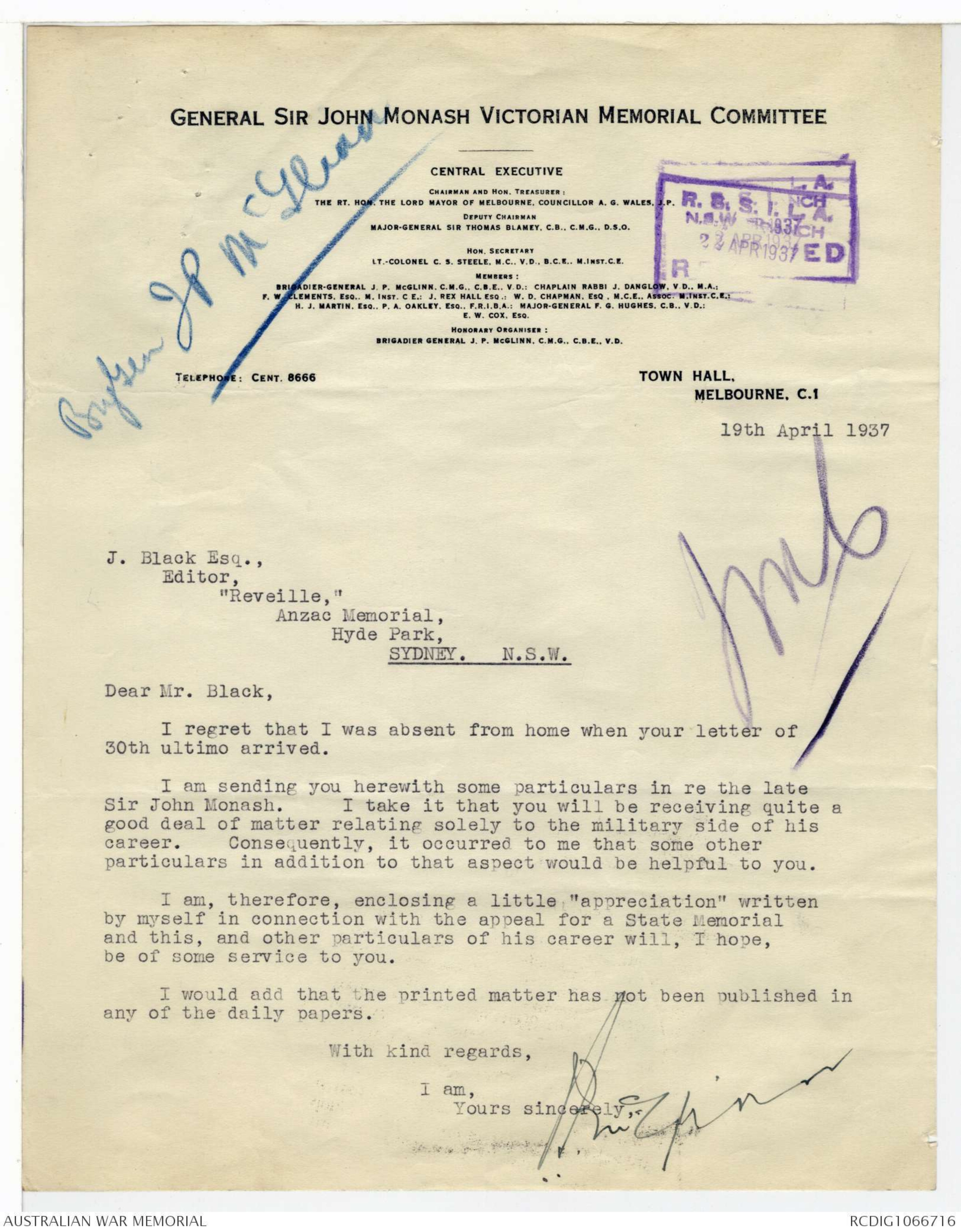
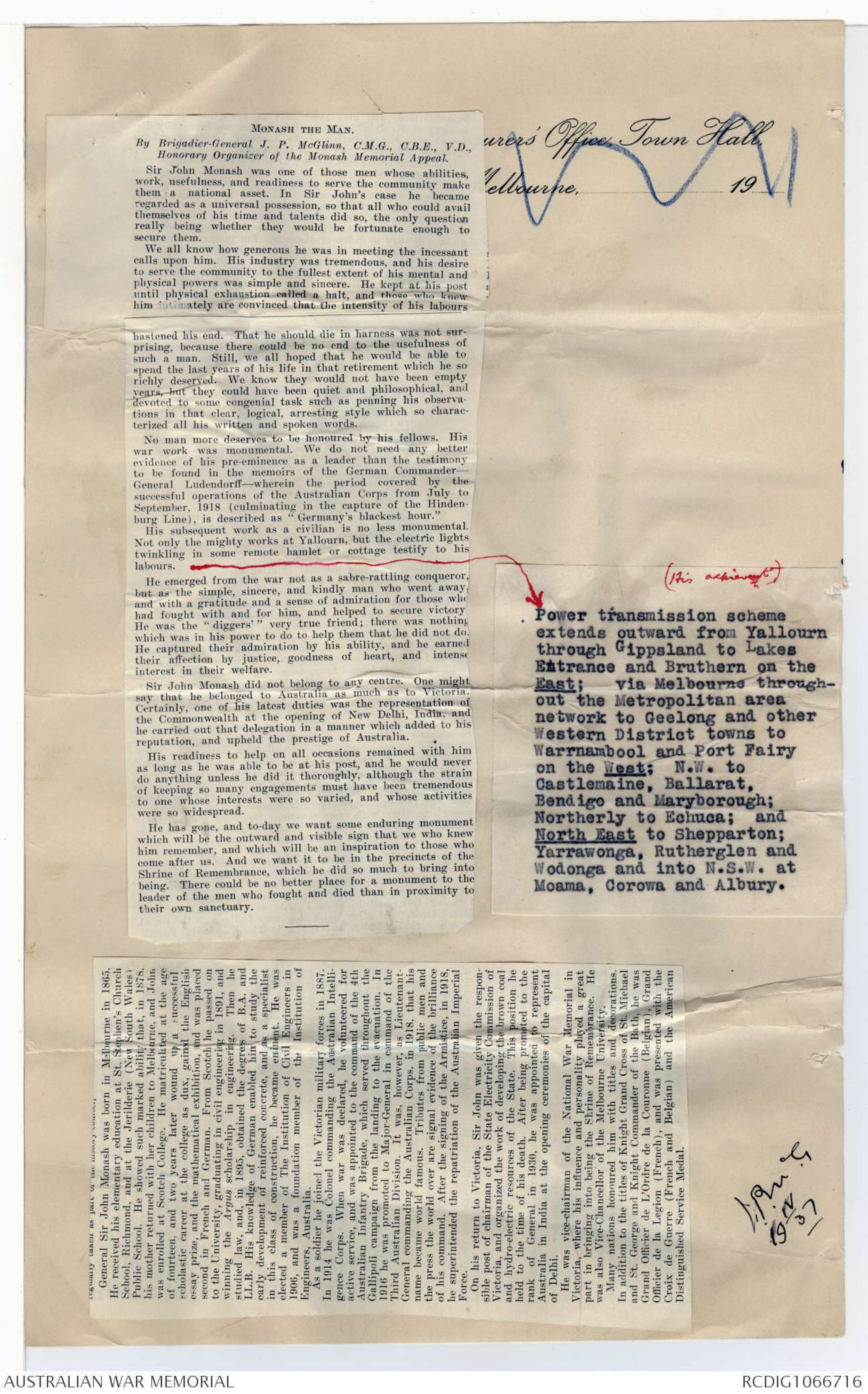
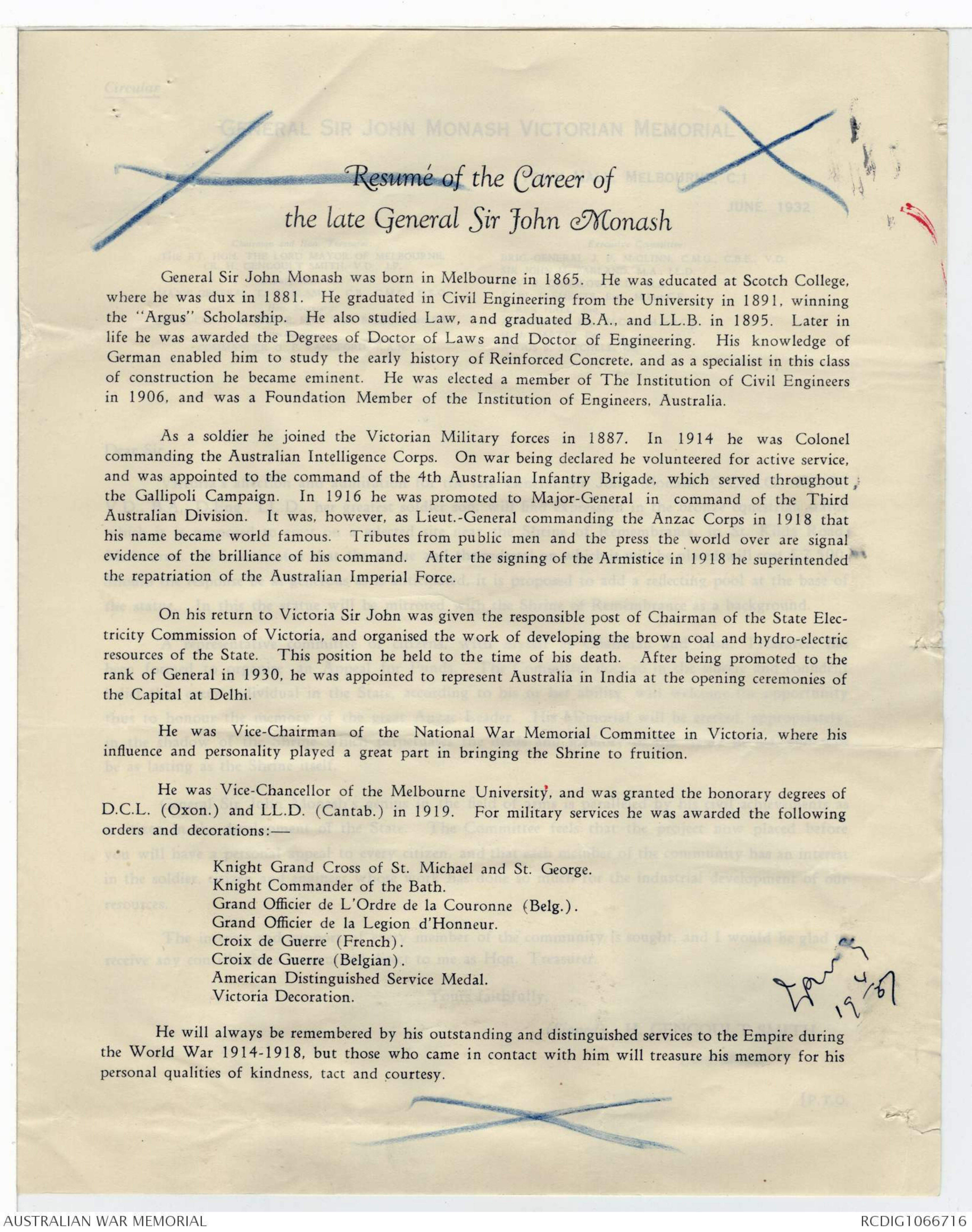
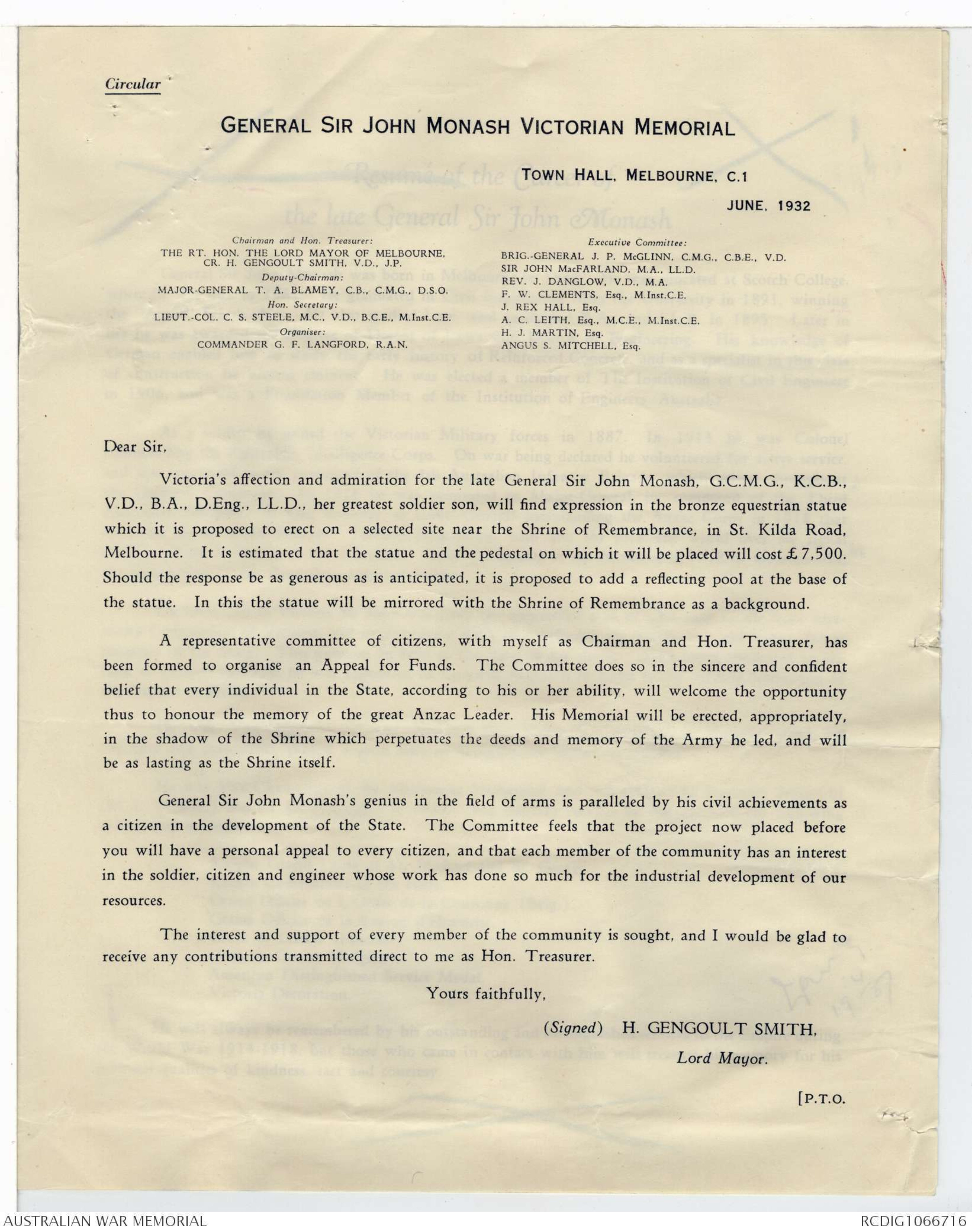
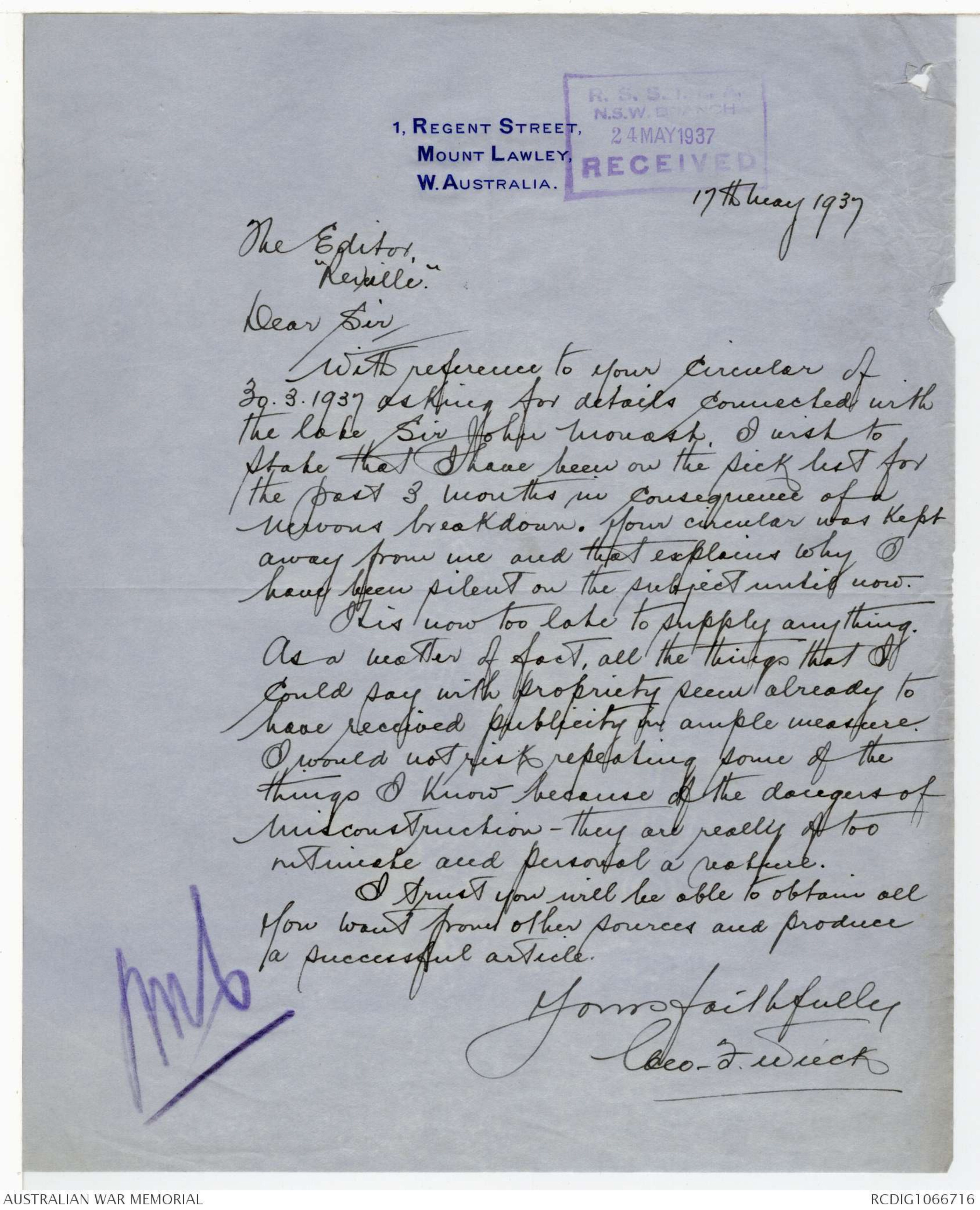
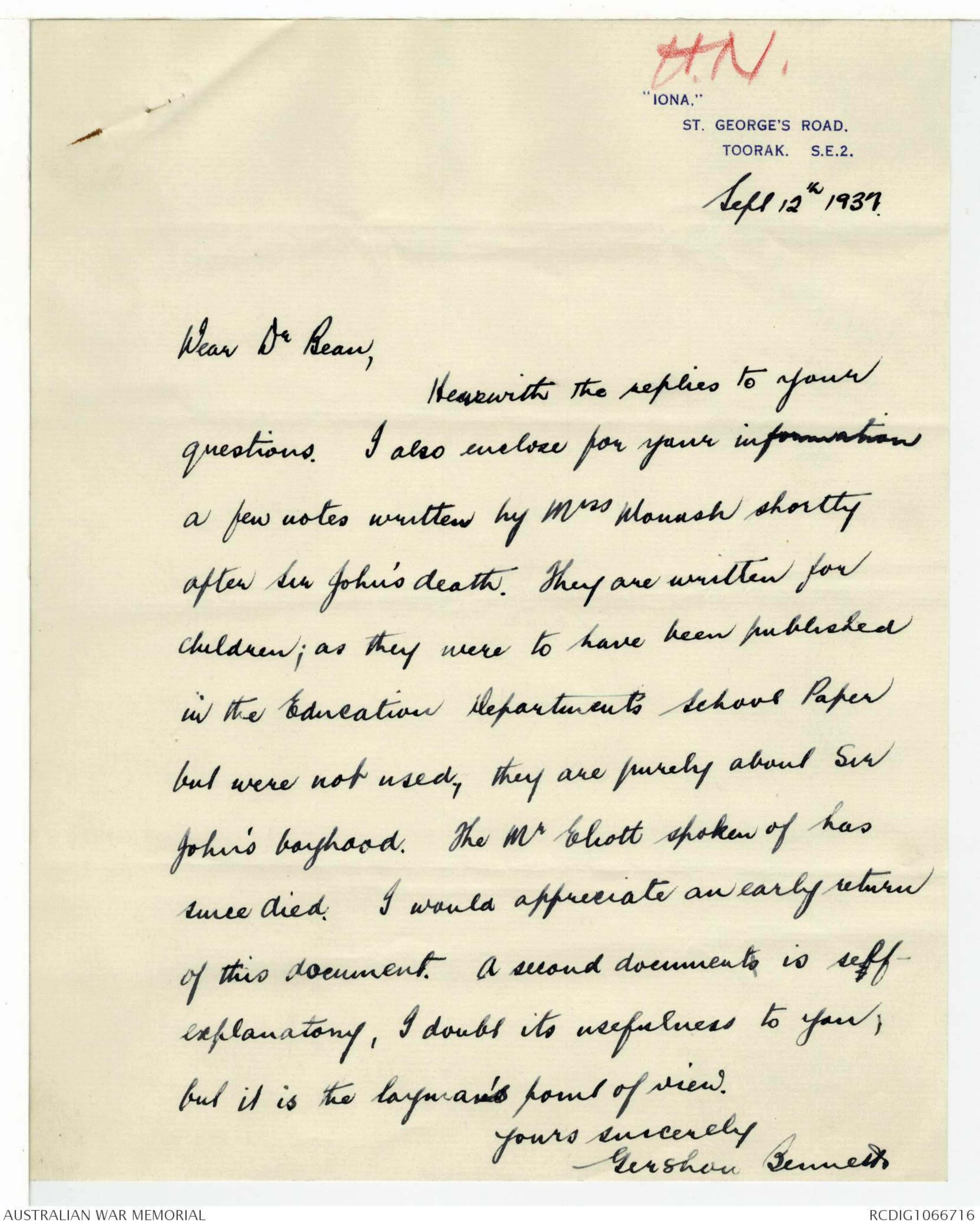
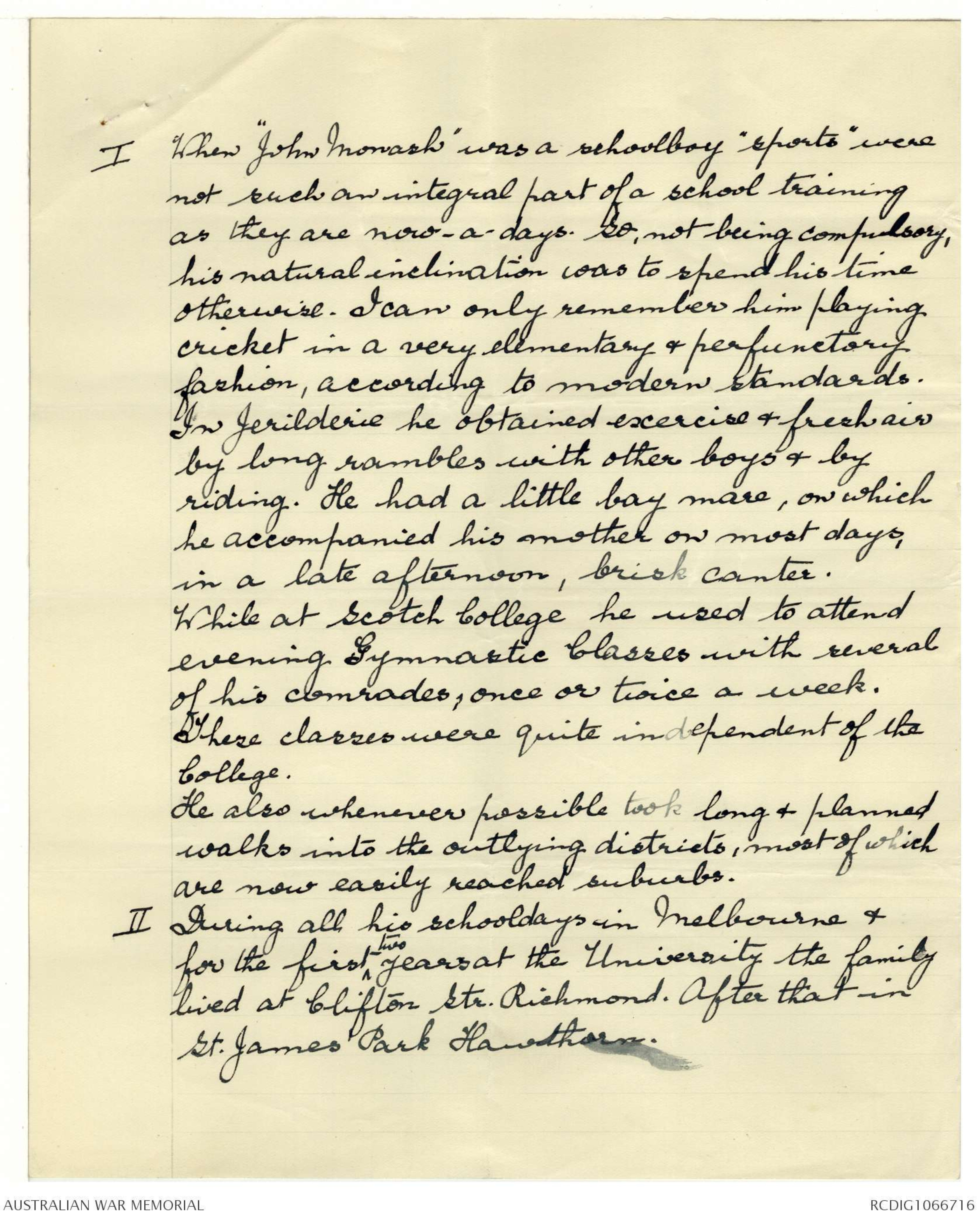
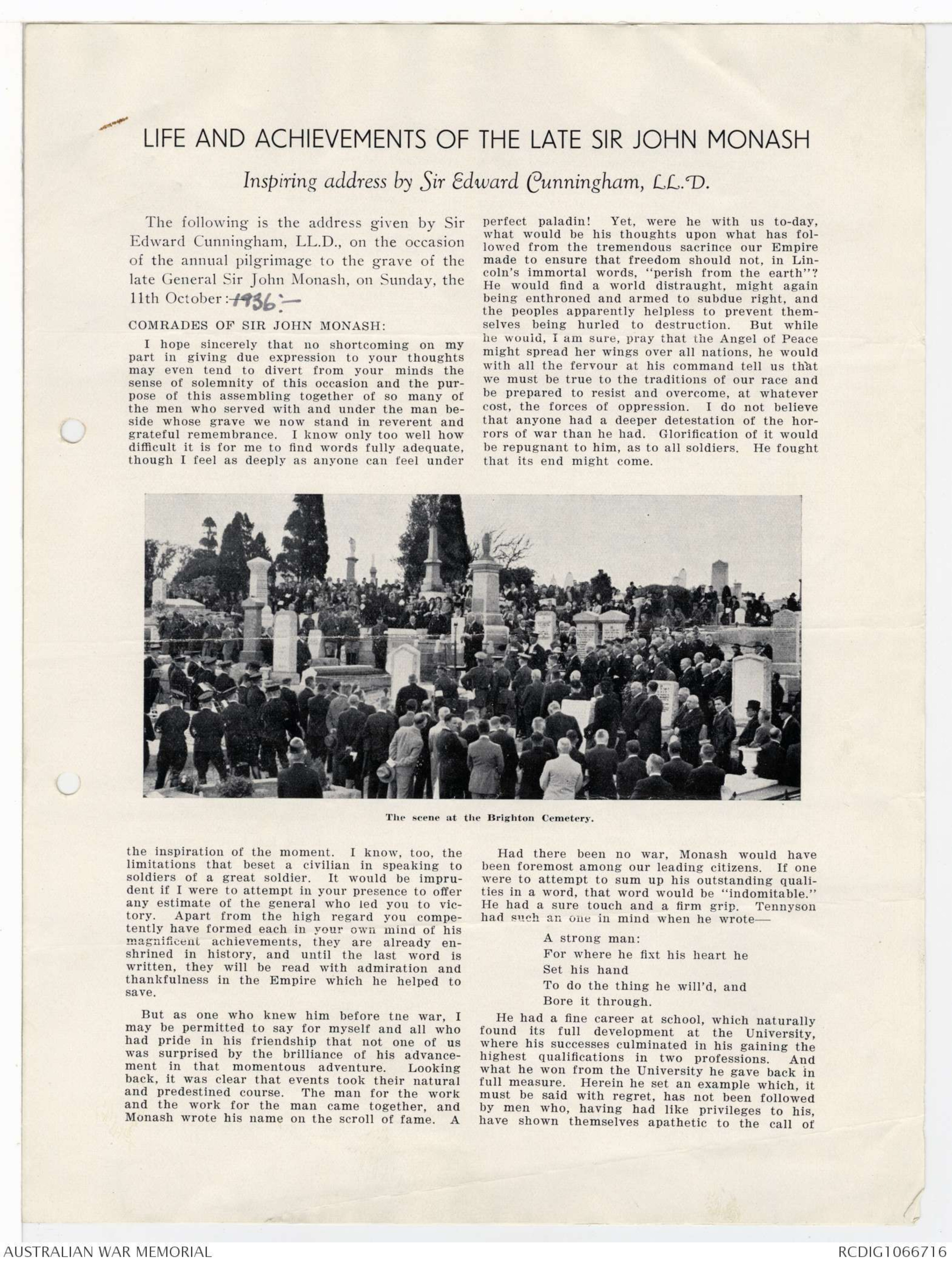
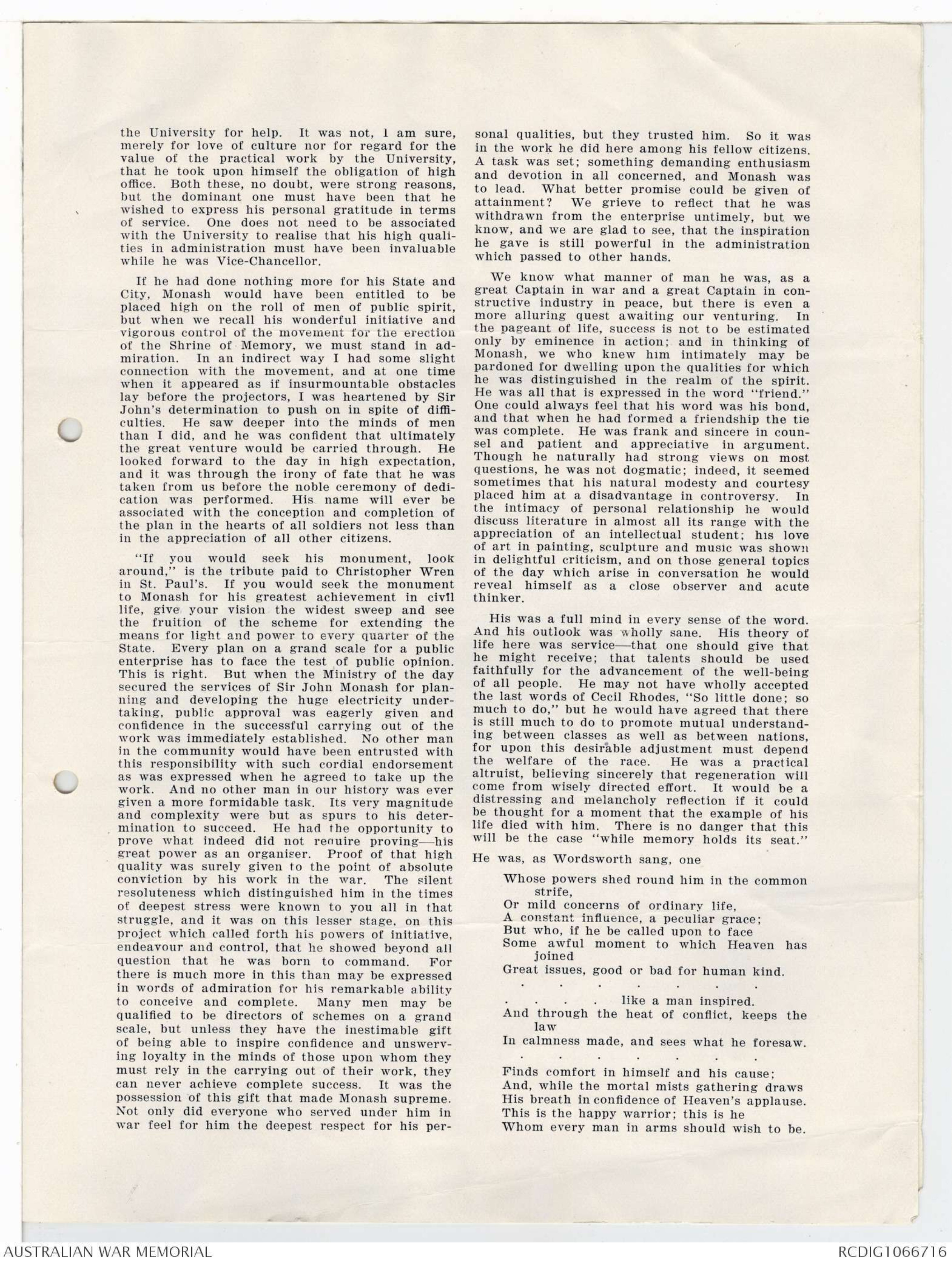
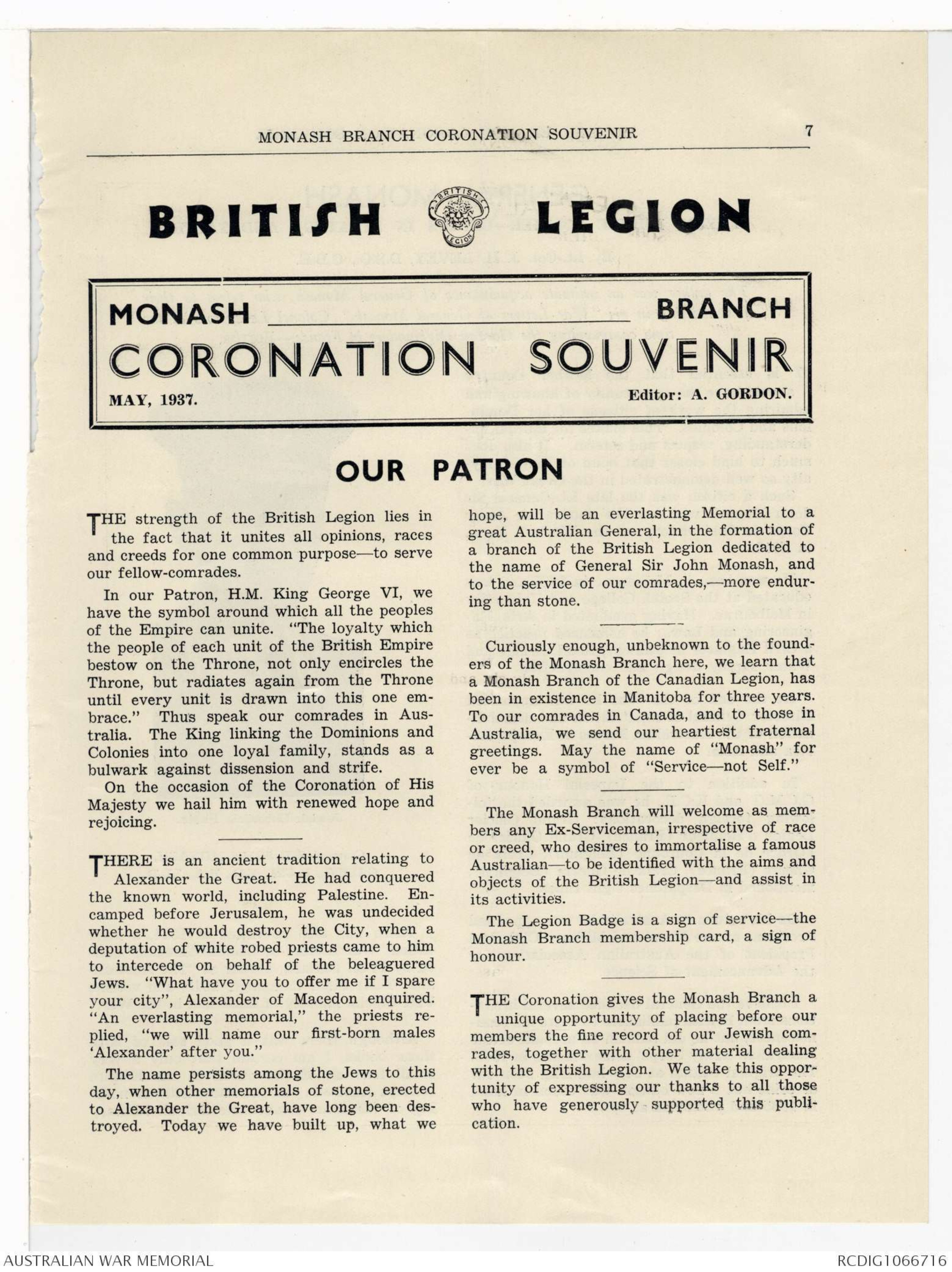
GENERAL SIR JOHN MONASH VICTORIAN MEMORIAL COMMITTEE
CENTRAL EXECUTIVE
CHAIRMAN AND HON. TREASURER:
THE RT. HON. THE LORD MAYOR OF MELBOURNE, COUNCILLOR A. G. WALES, J.P.
DEPUTY CHAIRMAN
MAJOR-GENERAL SIR THOMAS BLAMEY, C.B., C.M.G., D.S.O.
HON. SECRETARY
LT.-COLONEL C. S. STEELE, M.C., V.D., B.C.E., M.INST.C.E.
MEMBERS:
BRIGADIER-GENERAL J. P. McGLINN, C.M.G., C.B.E., V.D.: CHAPLAIN RABBI J. DANGLOW, V.D., M.A.:
F. W. CLEMENTS, ESQ., M. INST. C.E.: J. REX HALL ESQ.: W. D. CHAPMAN, ESQ, M.C.E., ASSOC. M.INST.C.E.:
H. J. MARTIN ESQ., P. A. OAKLEY, ESQ., F.R.I.B.A.: MAJOR-GENERAL F. G. HUGHES, C.B., V.D.:
E. W. COX, ESQ.
HONORARY ORGANISER:
BRIGADIER-GENERAL J. P. McGLINN, C.M.G., C.B.E., V.D.
TELEPHONE: CENT. 8666
TOWN HALL,
MELBOURNE, C.1
[*Brig Gen JP McGlinn*]
R.S.S.I.L.A.
N.S.W. BRANCH
23 APR 1937 ED
RE
19th April 1937
J. Black Esq.,
Editor,
"Reveille,"
Anzac Memorial,
Hyde Park,
SYDNEY. N.S.W.
[*JmG*]
Dear Mr. Black,
I regret that I was absent from home when your letter of
30th ultimo arrived.
I am sending you herewith some particulars in re the late
Sir John Monash. I take it that you will be receiving quite a
good deal of matter relating solely to the military side of his
career. Consequently, it occurred to me that some other
particulars in addition to that aspect would be helpful to you.
I am, therefore, enclosing a little "appreciation" written
by myself in connection with the appeal for a State Memorial
and this, and some other particulars of his career will, I hope,
be of some service to you.
I would add that the printed matter has not been published in
any of the daily papers.
With kind regards,
I am,
Yours sincerely,
J.P. McGlinn
urer's Office, Town Hall,Melbourne, 19
MONASH THE MAN.
By Brigadier-General J. P. McGlinn. C.M.G., C.B.E., V.D.,
Honorary Organizer of the Monash Memorial Appeal.
Sir John Monash was one of those men whose abilities,
work, usefulness, and readiness to serve the community make
them a national asset. In Sir John's case he became
regarded as a universal possession, so that all who could avail
themselves of his time and talents did so, the only question
really being whether they would be fortunate enough to
secure them.
We all know how generous he was in meeting the incessant
calls upon him. His industry was tremendous, and his desire
to serve the community to the fullest extent of his mental and
physical powers was simple and sincere. He kept at his post
until physical exhaustion called a halt, and those who knew
him intimately are convinced that the intensity of his labours
hastened his end. That he should die in harness was not surprising,
because there could be no end to the usefulness of
such a man. Still, we all hoped that he would be able to
spend the last years of his life in that retirement which he so
richly deserved. We know they would not have been empty
years, but they could have been quiet and philosophical, and
devoted to some congenial task such as penning his observations
in that clear, logical, arresting style which so characterized
all his written and spoken words.
No man more deserves to be honoured by his fellows. His
war work was monumental. We do not need any better
evidence of his pre-eminence as a leader than the testimony
to be found in the memoirs of the German Commander -
General Ludendorff - wherein the period covered by the
successful operations of the Australian Corps from July to
September, 1918 (culminating in the capture of the Hindenburg
Line), is described as "Germany's blackest hour."
His subsequent work as a civilian is no less monumental.
Not only the mighty works at Yallourn, but the electric lights
twinkling in some remote hamlet or cottage testify to his
labours.
[*(His achievemts)
→ Power transmission scheme
extends outward from Yallourn
through Gippsland to Lakes
Entrance and Bruthern on the
East; via Melbourne throughout
the Metropolitan area
network to Geelong and other
Western District towns
to Warrnambool and Port Fairy
on the West; N.W. to
Castlemaine, Ballarat,
Bendigo and Maryborough;
Northerly to Echuca; and
North East to Shepparton;
Yarrawonga, Rutherglen and
Wodonga and into N.S.W. at
Moama, Corowa and Albury.*]
He emerged from the war not as a sabre-rattling conqueror,
but as a simple, sincere, and kindly man who went away,
and with a gratitude and a sense of admiration for those who
had fought with and for him, and helped to secure victory
He was the "diggers' " very true friend; there was nothing
which was in his power to do to help them that he did not do.
He captured their admiration by his ability, and he earned
their affection by justice, goodness of heart, and intense
interest in their welfare.
Sir John Monash did not belong to any centre. One might
say he belonged to Australia as much as to Victoria.
Certainly, one of his latest duties was the representation of
the Commonwealth at the opening of new Delhi, India, and
he carried out that delegation in a manner which added to his
reputation, and upheld the prestige of Australia.
His readiness to help on all occasions remained with him
as long as he was able to be at his post, and he would never
do anything unless he did it thoroughly, although the strain
of keeping so many engagements must have been tremendous
to one whose interests were so varied, and whose activities
were so widespread.
He has gone, and to-day we want some enduring monument
which will be the outward and visible sign that we who knew
him remember, and which will be an inspiration to those who
come after us. And we want it to be in the precincts of the
Shrine of Remembrance, which he did so much to bring into
being. There could be no better place for a monument to the
leader of the men who fought and died there than in proximity to
their own sanctuary.
General Sir John Monash was born in Melbourne in 1865.
He received his elementary education at St. Stephen's Church
School, Richmond, and at the Jerilderie (New South Wales)
Public School. He showed such marked ability that, in 1878,
his mother returned with her children to Melbourne, and John
was enrolled at Scotch College. He matriculated at the age
of fourteen, and two years later wound up a successful
scholastic career at the college as dux, gained the English
essay prize, and the mathematical exhibition, and was placed
second in French and German. From Scotch he passed on
to the University, graduating in civil engineering in 1891, and
winning the Argus scholarship in engineering. Then he
studied law, and, in 1895, obtained the degrees of B.A. and
LL.B. His knowledge of German enabled him to study the
early development of reinforced concrete, and as a specialist
in this class of construction, he became eminent. He was
elected a member of The Institution of Civil Engineers in
1906, and was a foundation member of the Institution of
Engineers, Australia.
As a soldier he joined the Victorian military forces in 1887.
In 1914 he was Colonel commanding the Australian Intelligence
Corps. When war was declared, he volunteered for
active service, and was appointed to the command of the 4th
Australian Infantry Brigade, which served throughout the
Gallipoli campaign from the landing to the evacuation. In
1916 he was promoted to Major-General in command of the
Third Australian Division. It was, however, as Lieutenant-
General commanding the Australian Corps, in 1918, that his
name became world famous. Tributes from public men and
the press the world over are signal evidence of the brilliance
of his command. After the signing of the Armistice, in 1918,
he superintended the repatriation of the Australian Imperial
Force.
On his return to Victoria, Sir John was given the responsible
post of chairman of the State Electricity Commission of
Victoria, and organized the work of developing the brown coal
and hydro-electric resources of the State. This position he
held to the time of his death. After being promoted to the
rank of General in 1930, he was appointed to represent
Australia in India at the opening ceremonies of the capital
of Delhi.
He was vice-chairman of the National War Memorial in
Victoria, where his influence and personality played a great
part in bringing into being the Shrine of Remembrance. He
was also Vice-Chancellor of the Melbourne University.
Many nations honoured him with titles and decorations.
In addition to the titles of Knight Grand Cross of St. Michael
and St. George and Knight Commander of the Bath, he was
Grand Officer de L'Ordre de la Couronne (Belgian), Grand
Officer de la Legion (French), and was presented with the
Croix de Guerre (French and Belgian) and the American
Distinguished Service Medal.
J.P.Mc.G
19 IV/37
X Resumé of the Career of
the late General Sir John Monash X
General Sir John Monash was born in Melbourne in 1865. He was educated at Scotch College,
where he was dux in 1881. He graduated in Civil Engineering from the University in 1891, winning
the "Argus" Scholarship. He also studied Law, and graduated B.A., and LL.B. in 1895. Later in
life he was awarded the Degrees of Doctor of Laws and Doctor of Engineering. His knowledge of
German enabled him to study the early history of Reinforced Concrete, and as a specialist in this class
of construction, he became eminent. He was elected a member of The Institution of Civil Engineers
in 1906, and was a Foundation Member of the Institution of Engineers, Australia.
As a soldier he joined the Victorian Military forces in 1887. In 1914 he was Colonel
commanding the Australian Intelligence Corps. On war being declared, he volunteered for active service,
and was appointed to the command of the 4th Australian Infantry Brigade, which served throughout
the Gallipoli Campaign. In 1916 he was promoted to Major-General in command of the Third
Australian Division. It was, however, as Lieut.-General commanding the Anzac Corps, in 1918, that
his name became world famous. Tributes from public men and the press the world over are signal
evidence of the brilliance of his command. After the signing of the Armistice in 1918 he superintended
the repatriation of the Australian Imperial Force.
On his return to Victoria Sir John was given the responsible post of Chairman of the State Electricity
Commission of Victoria, and organised the work of developing the brown coal and hydro-electric
resources of the State. This position he held to the time of his death. After being promoted to the
rank of General in 1930, he was appointed to represent Australia in India at the opening ceremonies of
the Capital at Delhi.
He was Vice-Chairman of the National War Memorial Committee in Victoria, where his
influence and personality played a great part in bringing the Shrine to fruition.
He was Vice-Chancellor of the Melbourne University, and was granted the honorary degrees of
D.C.I., (Oxon.) and LL.D. (Cantab.) in 1919. For military services he was awarded the following
orders and decorations:-
Knight Grand Cross of St. Michael and St. George.
Knight Commander of the Bath.
Grand Officer de L'Ordre de la Couronne (Belg.).
Grand Officer de la Legion d'Honneur.
Croix de Guerre (French).
Croix de Guerre (Belgian).
American Distinguished Service Medal.
Victoria Decoration.
[*JPMcG
19 4/37*]
He will always be remembered by his outstanding and distinguished services to the Empire during
the World War 1914-1918, but those who came in contact with him will treasure his memory for his
personal qualities of kindness, tact and courtesy.
X
Circular
GENERAL SIR JOHN MONASH VICTORIAN MEMORIAL
TOWN HALL, MELBOURNE. C.1
JUNE, 1932
Chairman and Hon. Treasurer:
THE RT. HON. THE LORD MAYOR OF MELBOURNE,
CR. H. GENGOULT SMITH, V.D., J.P.
Deputy-Chairman:
MAJOR-GENERAL T. A. BLAMEY, C.B., C.M.G., D.S.O
Hon. Secretary:
LIEUT.-COL. C. S.STEELE, M.C., V.D., B.C.E., M.Inst.C.E.
Organiser:
COMMANDER G. F. LANGFORD, R.A.N.
Executive Committee:
BRIG.-GENERAL J. P. McGLINN, C.M.G., C.B.E., V.D.
SIR JOHN MacFARLAND, M.A., LL.D.
REV. J. DANGLOW, V.D., M.A.
F. W. CLEMENTS. Esq., M.Inst.C.E.
J. REX HALL, Esq.
A. C. LEITH, Esq., M.C.E., M.Inst.C.E.
H. J. MARTIN, Esq.
ANGUS S. MITCHELL, Esq.
Dear Sir,
Victoria's affection and admiration for the late General Sir John Monash, G.C.M.G., K.C.B.,
V.D., B.A., D.Eng., LL.D., her greatest soldier son, will find expression in the bronze equestrian statue
which it is proposed to erect on a selected site near the Shrine of Remembrance, in St. Kilda Road,
Melbourne. It is estimated that the statue and the pedestal on which it will be placed will cost £7,500.
Should the response be as generous as is anticipated, it is proposed to add a reflecting pool at the base of
the statue. In this the stature will be mirrored with the Shrine of Remembrance as a background.
A representative committee of citizens, with myself as Chairman and Hon. Treasurer, has
been formed to organise an Appeal for Funds. The Committee does so in the sincere and confident
belief that every individual in the State, according to his or her ability, will welcome the opportunity
thus to honour the memory of the great Anzac Leader. His Memorial will be erected, appropriately,
in the shadow of the Shrine which perpetuates the deeds and memory of the Army he led, and will
be as lasting as the Shrine itself.
General Sir John Monash's genius in the field of arms is paralleled by his civil achievements as
a citizen in the development of the State. The Committee feels that the project now placed before
you will have a personal appeal to every citizen, and that each member of the community has an interest
in the soldier, citizen and engineer whose work has done so much for the industrial development of our
resources.
The interest and support of every member of the community is sought, and I would be glad to
receive any contributions transmitted direct to me as Hon. Treasurer.
Yours faithfully,
(Signed) H. GENGOULT SMITH,
Lord Mayor.
[P.T.O.
R.S.S.I.L.A.
N.S.W. BRANCH
24 MAY 1937
RECEIVED
1, REGENT STREET,
MOUNT LAWLEY,
W.AUSTRALIA.
17th May 1937
The Editor,
"Reveille."
Dear Sir
With reference to your circular of
30.3.1937 asking for details connected with
the late Sir John Monash. I wish to
state that I have been on the sick list for
the past 3 months in consequence of a
nervous breakdown. Your circular was kept
away from me and that explains why I
have been silent on the subject until now.
It is now too late to supply anything.
As a matter of fact, all the things that I
could say with propriety seem already to
have received publicity in ample measure.
I would not risk repeating some of the
things I know because of the dangers of
misconstruction - they are really of too
intimate and personal a nature.
I trust you will be able to obtain all
you want from other sources and produce
a successful article.
Yours faithfully
[[?]] F. Wieck
[*JMG*]
H.N.
"IONA,"
ST. GEORGE'S ROAD,
TOORAK. S.E.2.
Sept 12th 1937.
Dear Dr Bean,
Herewith the replies to your
questions. I also enclose for your information
a few notes written by Miss Monash shortly
after Sir John's death. They are written for
children; as they were to have been published
in the Education Department's School Paper
but were not used, they are purely about Sir
John's boyhood. The Mr eliott spoken of has
since died. I would appreciate an early return
of this document. A second documents is self-
explanatory, I doubt its usefulness to you;
but it is the layman's point of view.
Yours sincerely
Gershon Bennett
I When "John Monash" was a schoolboy "sports" were
not such an integral part of a school training
as they are now-a-days. So, not being compulsory,
his natural inclination was to spend his time
otherwise. I can only remember him playing
cricket in a very elementary & perfunctory
fashion, according to modern standards.
In Jerilderie he obtained exercise & fresh air
by long rambles with other boys & by
riding. He had a little bay mare, on which
he accompanied his mother on most days,
in a late afternoon, brisk canter.
While at Scotch College he used to attend
evening Gymnastic Classes with several
of his comrades, once or twice a week.
These classes were quite independent of the
College.
He also whenever possible took long & planned
walks into the outlying districts, most of which
are now easily reached suburbs.
II During all his shooldays in Melbourne &
for the first ^two years at the University the family
lived at Clifton Str. Richmond. After that in
St. James Park Hawthorn.
LIFE AND ACHIEVEMENTS OF THE LATE SIR JOHN MONASH
Inspiring address by Sir Edward Cunningham, LL.D.
The following is the address given by Sir
Edward Cunningham, LL.D., on the occasion
of the annual pilgrimage to the grave of the
late General Sir John Monash, on Sunday, the
11th October: 1936:-
COMRADES OF SIR JOHN MONASH:
I hope sincerely that no shortcoming on my
part in giving due expression to your thoughts
may even tend to divert from your minds the
sense of solemnity of this occasion and the purpose
of this assembling together of so many of
the men who served with and under the man beside
whose grave we now stand in reverent and
grateful remembrance. I know only too well how
difficult it is for me to find words fully adequate,
though I feel as deeply as anyone can feel under
Photograph – see original
The scene at Brighton Cemetery.
the inspiration of the moment. I know, too, the
limitations that beset a civilian in speaking to
soldiers of a great soldier. It would be imprudent
if I were to attempt in your presence to offer
any estimate of the general who led you to victory.
Apart from the high regard you competently
have formed each in your own mind of his
magnificent achievements, they are already enshrined
in history, and until the last word is
written, they will be read with admiration and
thankfulness in the Empire which he helped to
save.
But as one who knew him before the war, I
may be permitted to say for myself and all who
had pride in his friendship that not one of us
was surprised by the brilliance of his advancement
in that momentous adventure. Looking
back, it was clear that events took their natural
and predestined course. The man for the work
and the work for the man came together, and
Monash wrote his name on the scroll of fame. A
perfect paladin! Yet, were he with us to-day,
what would be his thoughts upon what has followed
from the tremendous sacrifice our Empire
made to ensure that freedom should not, in Lincoln's
immortal words, "perish from the earth"?
He would find a world distraught, might again
being enthroned and armed to subdue right, and
the peoples apparently helpless to prevent themselves
being hurled to destruction. But while
he would, I am sure, pray that the Angel of Peace
might spread her wings over all nations, he would
with all the fervour at his command tell us that
we must be true to the traditions of our race and
be prepared to resist and overcome, at whatever
cost, the forces of oppression. I do not believe
that anyone had a deeper detestation of the horrors
of war than he had. Glorification of it would
be repugnant to him, as to all soldiers. He fought
that its end might come.
Had their been no war, Monash would have
been foremost among our leading citizens. If one
were to attempt to sum up his outstanding qualities
in a word, that word would be "indomitable."
He had such a sure touch and a firm grip. Tennyson
had such an one in mind when he wrote—
A strong man:
For where he fixt his heart he
Set his hand
To do the thing he will'd, and
Bore it through.
He had a fine career at school, which naturally
found its full development at the University,
where his successes culminated in his gaining the
highest qualifications in two professions. And
what he won from the University he gave back in
full measure. Herein he set an example which, it
must be said with regret, has not been followed
by men who, having had like privileges to his,
have shown themselves apathetic to the call of
the University for help. It was not, I am sure,
merely for the love of culture nor for regard for the
value of the practical work by the University,
that he took upon himself the obligation of high
office. Both these, no doubt, were strong reasons,
but the dominant one must have been that he
wished to express his personal gratitude in terms
of service. One does not need to be associated
with the University to realise that his high qualities
in administration must have been invaluable
while he was Vice-Chancellor.
If he had done nothing more for his State and
City, Monash would have been entitled to be
placed high on the roll of men of public spirit,
but when we recall his wonderful initiative and
vigorous control of the movement for the erection
of the Shrine of Memory, we must stand in
admiration. In an indirect way I had some slight
connection with the movement, and at one time
when it appeared as if insurmountable obstacles
lay before the projectors, I was heartened by Sir
John's determination to push on in spite of
difficulties. He saw deeper into the minds of men
than I did, and he was confident that ultimately
the great venture would be carried through. He
looked forward to the day in high expectation,
and it was through the irony of fate that he was
taken from us before the noble ceremony of
dedication was performed. His name will ever be
associated with the conception and completion of
the plan in the hearts of all soldiers not less than
in the appreciation of all other citizens.
"If you would seek his monument, look
around," is the tribute paid to Christopher Wren
in St. Paul's. If you would seek the monument
to Monash for his greatest achievement in civil
life, give your vision the widest sweep and see
the fruition of the scheme for extending the
means for light and power to every quarter of the
State. Every plan on a grand scale for a public
enterprise has to face the test of public opinion.
This is right. But when the Ministry of the day
secured the services of Sir John Monash for planning
and developing the huge electricity undertaking,
public approval was eagerly given and
confidence in the successful carrying out of the
work was immediately established. No other man
in the community would have been entrusted with
this responsibility with such cordial endorsement
as was expressed when he agreed to take up the
work. And no other man in our history was ever
given a more formidable task. Its very magnitude
and complexity were but as spurs to his
determination to succeed. He had the opportunity to
prove what indeed did not require proving - his
great power as an organiser. Proof of that high
quality was surely given to the point of absolute
conviction by his work in the war. The silent
resoluteness which distinguished him in the times
of deepest stress were known to you all in that
struggle, and it was on this lesser stage, on this
project which called forth his powers of initiative,
endeavour and control, that he showed beyond all
question that he was born to command. For
there is much more in this than may be expressed
in words of admiration for his remarkable ability
to conceive and complete. Many men may be
qualified to be directors of schemes on a grand
scale, but unless they have the inestimable gift
of being able to inspire confidence and unswerving
loyalty in the minds of those upon whom they
must rely in the carrying out of their work, they
can never achieve complete success. It was the
possession of this gift that made Monash supreme.
Not only did everyone who served under him in
war feel for him the deepest respect for his
personal qualities, but they trusted him. So it was
in the work he did here among his fellow citizens.
A task was set; something demanding enthusiasm
and devotion in all concerned, and Monash was
to lead. What better promise could be given of
attainment? We grieve to reflect that he was
withdrawn from the enterprise untimely, but we
know, and we are glad to see, that the inspiration
he gave is still powerful in the administration
which passed to other hands.
We know what manner of man he was, as a
great Captain in war and a great Captain in
constructive industry in peace, but there is even a
more alluring quest awaiting our venturing. In
the pageant of life, success is not to be estimated
only by eminence in action; and in thinking of
Monash, we who knew him intimately may be
pardoned for dwelling upon the qualities for which
he was distinguished in the realm of the spirit.
He was all that is expressed in the word "friend."
One could always feel that his word was his bond,
and that when he had formed a friendship the tie
was complete. He was frank and sincere in
counsel and patient and appreciative in argument.
Though he naturally had strong views on most
questions, he was not dogmatic; indeed, it seemed
sometimes that his natural modesty and courtesy
placed him at a disadvantage in controversy. In
the intimacy of personal relationship he would
discuss literature in almost all its range with the
appreciation of an intellectual student; his love
of art in painting, sculpture and music was shown
in delightful criticism, and on those general topics
of the day which arise in conversation he would
reveal himself as a close observer and acute
thinker.
His was a full mind in every sense of the word.
And his outlook was wholly sane. His theory of
life here was service - that one should give that
he might receive; that talents should be used
faithfully for the advancement of the well-being
of all people. He may not have wholly accepted
the last words of Cecil Rhodes, "So little done; so
much to do," but he wold have agreed that there
is still much to do to promote mutual understanding
between classes as well as between nations,
for upon this desirable adjustment must depend
the welfare of the race. He was a practical
altruist, believing sincerely that regeneration will
come from wisely directed effort. It would be a
distressing and melancholy reflection if it could
be thought for a moment that the example of his
life died with him. There is no danger that this
will be the case "while memory holds its seat."
He was, as Wordsworth sang, one
Whose powers shed round him in the common
strife,
Or mild concerns of ordinary life,
A constant influence, a peculiar grace;
But who, if he be called upon to face
Some awful moment to which Heaven has
joined
Great issues, good or bad for human kind.
. . . . . . .
. . . . like a man inspired.
And through the heat of conflict, keeps the
law
In calmness made, and sees what he foresaw.
. . . . . . .
Finds comfort in himself and his cause;
And, while the mortal mists gathering draws
His breath in confidence of Heaven's applause.
This is the happy warrior; this is he
Whom every man in arms should wish to be.
MONASH BRANCH CORONATION SOUVENIR
BRITISH LEGION
MONASH BRANCH
CORONATION SOUVENIR
MAY, 1937.
Editor: A. GORDON.
OUR PATRON
THE strength of the British Legion lies in
the fact that it unites all opinions, races
and creeds for one common purpose - to serve
our fellow-comrades.
In our Patron, H.M. King George VI, we
have the symbol around which all the peoples
of the Empire can unite. "The loyalty which
the people of each unit of the British Empire
bestow on the Throne, not only encircles the
Throne, but radiates again from the Throne
until every unit is drawn into this one
embrace." Thus speak our comrades in
Australia. The King linking the Dominions and
Colonies into one loyal family, stands as a
bulwark against dissension and strife.
On the occasion of the Coronation of His
Majesty we hail him with renewed hope and
rejoicing.
THERE is an ancient tradition relating to
Alexander the Great. He had conquered
the known world, including Palestine.
Encamped before Jerusalem, he was undecided
whether he would destroy the City, when a
deputation of white robed priests came to him
to intercede on behalf of the beleaguered
Jews. "What have you to offer me if I spare
your city", Alexander of Macedon enquired.
"An everlasting memorial," the priests
replied, "we will name our first-born males
'Alexander' after you."
The name persists among the Jews to this
day, when other memorials of stone, erected
to Alexander the Great, have long been
destroyed. Today we have built up, what we
hope, will be an everlasting Memorial to a
great Australian General, in the formation of
a branch of the British Legion dedicated to
the name of General Sir John Monash, and
to the service of our comrades, - more enduring
than stone.
Curiously enough, unbeknown to the founders
of the Monash Branch here, we learn that
a Monash Branch of the Canadian Legion, has
been in existence in Manitoba for three years.
To our comrades in Canada, and to those in
Australia, we send our heartiest fraternal
greetings. May the name of "Monash" for
every be a symbol of "Service - not Self."
The Monash Branch will welcome as members
any Ex-Serviceman, irrespective of race
or creed, who desires to immortalise a famous
Australian - to be identified with the aims and
objects of the British Legion - and assist in
its activities.
The Legion Badge is a sign of service - the
Monash Branch membership card, a sign of
honour.
THE Coronation gives the Monash Branch a
unique opportunity of placing before our
members the fine record of our Jewish
comrades, together with other material dealing
with the British Legion. We take this
opportunity of expressing our thanks to all those
who have generously supported this
publication.
 Sam scott
Sam scottThis transcription item is now locked to you for editing. To release the lock either Save your changes or Cancel.
This lock will be automatically released after 60 minutes of inactivity.